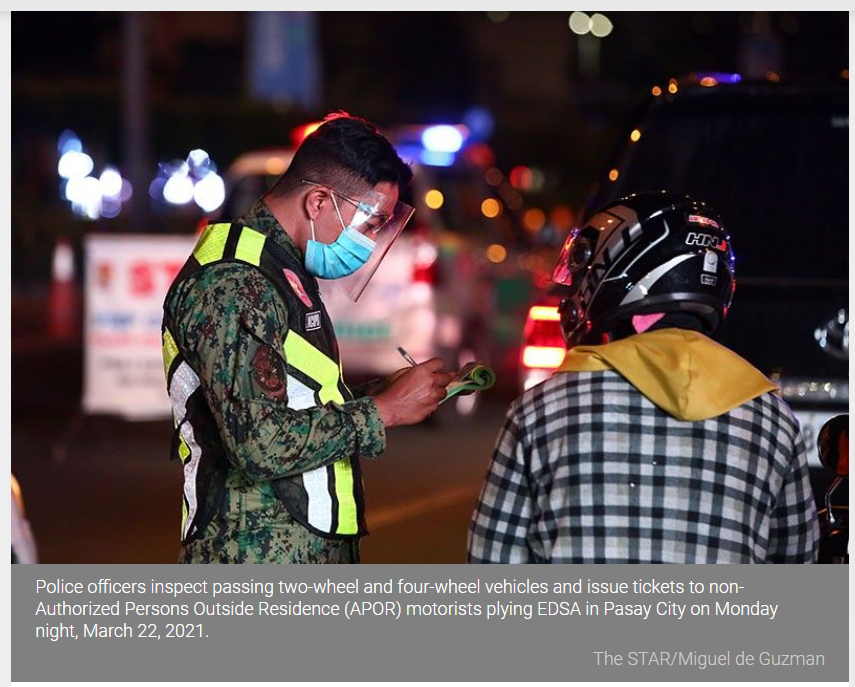Philippines: Deficit up, growth down put spending priorities into question
MANILA, Philippines — Alarm bells were rang over a yawning budget deficit that is only set to widen this year, but the economic impact of additional spending springing from it appears to be nearly nil that puts into question whether government is spending on the right priorities.
If there’s any consolation, economic officials led by Finance Secretary Carlos Dominguez III are open to adding P170 billion to existing spending plans to finance a much-needed relief package for sectors hurt by renewed lockdowns in Metro Manila and four nearby urban areas.
But there is one condition: any additional costs should have a counterpart revenue source whether from savings of agencies pooled together, or even larger dividends remitted by state companies to the national government. Even proceeds from asset sales— which Dominguez rejected last year— would qualify, just not more debt.
“We want this measure to be revenue neutral. As you see, our projected fiscal deficit has already increased,” Dominguez told reporters on Tuesday evening. “Now this is really getting to be very concerning so any additional stimulus program has to be revenue neutral.”
This hardline stance against more borrowing stems from a broader goal of maintaining fiscal stability in the face of a crisis. Historically, there is basis to this: in the 1997 Asian financial and 2008 global financial crises, a liquidity crunch was followed by a heavy debt burden that severely limited public funds for investments because of debt payments.
But things have changed, and in fact have turned around. The Philippines has a strong credit profile and debt watchers providing such ratings are willing to overlook a temporary spending boom if that means putting the economy back on track. Borrowing costs are also at record-lows, thanks to the central bank’s stimulus, prompting observers including those from the legislature to ask the Executive for a more compelling pandemic response.
Those calls seemed to have been answered by Dominguez’s willingness to fund a P170-billion assistance. In total, spending would also inch up 1.72% to P4.74 trillion this year from the original program of P4.6 trillion. That would push up the deficit to 9.4% of gross domestic product (GDP) in 2021, up from just 8.9% originally.
By next year, the deficit would also stay elevated at 7.7% of GDP, up from 7.4% initially, indicating the some spending boost may actually remain. But economists watching on the sidelines are not impressed, not when despite bigger disbursements, the economy is set to grow a slower 6-7% and 7-9% for those respective years. In short, the economy will underperform despite more fiscal stimulus supposedly doing the reverse.
On one hand, Nicholas Antonio Mapa, senior economist at ING Bank in Manila, said the problem is the added spending from the government came too little, too late and funneled to the wrong programs. “So far, we’ve seen piece-meal, watered down fiscal recovery bills most of which were diverted away from the sector that needed the most help: households,” he said in an email.
Indeed, the Duterte administration has stayed its course in funding big infrastructures, allotting billions of pesos into them in the belief that jobs they create would be a permanent fix to economic recession. There are signs this is materializing in the first quarter, but the 4.2% contraction at the time was still worse than expected, reviving appeals for direct subsidies especially to those who immediately need them.
“Authorities had put their money on (literally) the so called money multiplier, hoping that funds sent to banks would fund loans which would in turn find their way to employment and consumption,” Mapa explained. “The trickle down however has not panned out.”
Emilio Neri Jr., lead economist at Bank of the Philippine Islands, meanwhile blamed “fiscal conservatism” for the problem. “Other sovereigns avoided a massive decline of economic activities…in their respective economies through massive fiscal support even if it meant a ‘temporary’ credit rating downgrade,” he said.
“This is preferred over a permanent or a series of downgrades that could result from fiscal conservatism often associated with downward economic spirals and chronic widening of deficits,” Neri said in a separate email.
Mapa agreed. “Although we say this in hindsight, a forceful and early fiscal recovery plan oftentimes work best as they tend to right the economic ship sooner rather than later.”
Source: https://www.philstar.com/business/2021/05/19/2099337/deficit-up-growth-down-put-spending-priorities-question


 Thailand
Thailand




